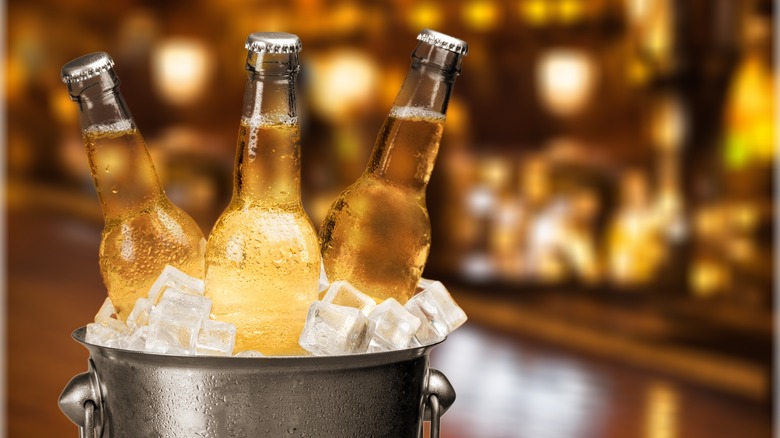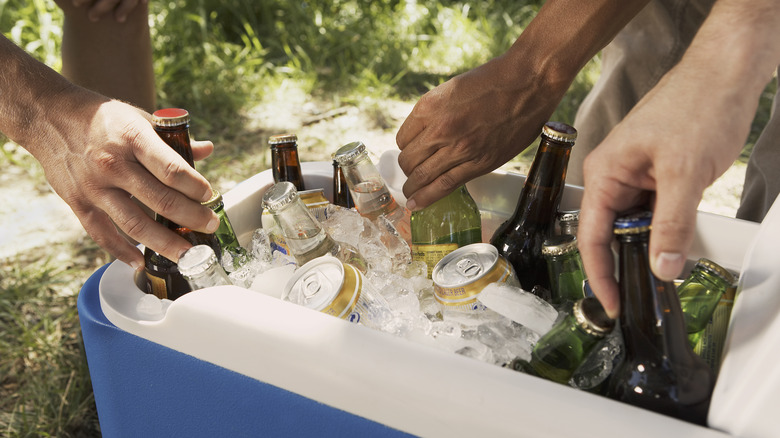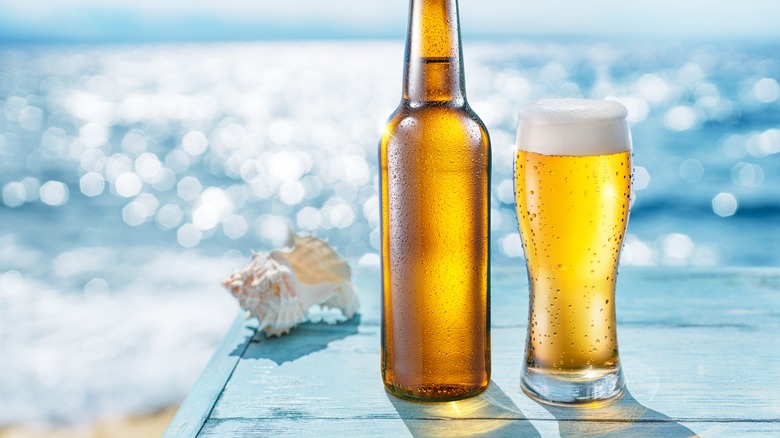The Beer Chilling Myth That Has No Actual Basis In Reality
Every culture around the world has its own drinking practices, and with that comes drinking myths. We're not talking about foundational alcohol myths either. There are no classes that teach first-time drinkers about the culture behind drinking alcohol, so it becomes a mostly oral tradition. Know-how and tricks like opening beer bottles when you forgot a bottle opener get shared from a cool uncle or more experienced roommate. This leads to many drinking falsehoods and myths that get passed down between the generations.
For example, MyRecipes lists some of the classics. Like how "breaking the seal" will allegedly have you running to the bathroom the rest of the night, that coffee can help sober you up, or that darker drinks are somehow healthier for you.
According to The Takeout, one of the biggest myths out there that have been spread far and wide is all about "skunked" beers. Some might have even designed their plans around how to keep the beer from skunking, but apparently, they've been going about it incorrectly.
The myth behind skunking
Beer Chronicle says that skunking is a term used to describe beer that has been improperly stored. Because of this, it takes on a musty and undesirable smell and taste that resembles the foul smell most often associated with skunks. Craig Stein Beverage says that when hops are added to the beer, they release iso-alpha acids which can break down to release sulfurous compounds.
The Takeout points out that the conventional wisdom says that this is due to cold beer coming back to room temperature. Many people will opt for room-temperature beer rather than those in the cooler when they're at the store to avoid this problem.
While skunking is a very real problem that comes from improper storage, it has nothing to do with temperature. In fact, The Takeout adds that most beer manufacturers initially package their beers at colder temperatures. Colder liquids hold onto their carbonation better, and so beer is sold chilled to keep from going flat. So, the next time you're out picking up a six-pack, you can skip the room temperature stuff, and just grab your beer from the cooler instead.
How skunking actually works
Just because you don't have to worry about your beer's temperature doesn't mean you don't have to worry about skunking though. Skunking is simply caused by other problems that may be related to where the myth first got its start.
The Takeout explains that the actual cause of skunking is when beer is exposed to sunlight. When the iso-alpha acids from hops are exposed to sunlight for too long they release the sulfurous compounds that will give a beer a "skunky" flavor and smell. This is the reason why some beers will ship in tinted glass. This tint can protect the beer, and lower the chances of skunking. Beer Chronicle adds that the darker the glass the better. If you're planning to hit the beach, it might be best to bring along some beers in dark brown glass or opt for cans instead to prevent skunking.
While exposure to sunlight is the main culprit of skunking, The Takeout admits that temperature can play a role in beer degradation. Beer should be stored at room temperature or lower to prevent it from going bad. If it spends even a short amount of time in high temperatures it can have roughly the same effect as true skunking can. It's possible that these overheated cans even led to the foundation of the myth. Someone tried to recool a beer that had been left in the heat for too long, and the legend was born.


